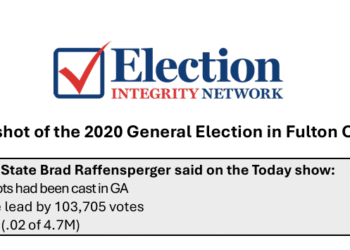In a Monday WarRoom conversation highlighting critical issues surrounding voter integrity, Ohio Secretary of State Frank LaRose provided insights into the ongoing efforts to maintain the accuracy of voter rolls in the state. LaRose revealed that his office has referred over 600 potential cases of voter fraud for prosecution this year alone, a figure he emphasized represents a serious commitment to ensuring electoral integrity amid the broader narrative dismissing such concerns. "That’s a small percentage of the 8 million registered voters,” LaRose noted, "but it’s a serious matter and we take it seriously.”
LaRose’s remarks come in response to ongoing debates in Washington, where some politicians argue that voter fraud is not a significant issue. He countered this viewpoint, asserting, "When the leftists in Washington say this is not a problem, they’re dead wrong.” His testimony in support of the SAVE Act in Washington reflects a proactive stance against potential election vulnerabilities exacerbated by current immigration policies.
Peter Navarro, who joined LaRose in the discussion, brought his own experience from serving on the U.S.-Mexico border as part of a counter-narcotics task force. He underscored the real-life implications of border security on public safety and elections. "The mass insecurity occurring on our southern border has led to a lot of problems,” he stated, reinforcing LaRose’s call for more robust checks on voter eligibility.
The conversation highlighted LaRose’s office’s systematic approaches to verify voter registrations. Utilizing data from the state Bureau of Motor Vehicles as a primary check, LaRose explained the challenges posed by the federal government’s limited support. "The federal government doesn’t make it easy,” he lamented, noting that while his office has access to the SAVE database from the Department of Homeland Security, there are additional databases that would significantly enhance their verification processes—databases that the Department of Homeland Security has yet to provide access to under Secretary Alejandro Mayorkas.
Despite these challenges, LaRose remains optimistic about the upcoming election cycle. He announced that early voting in Ohio will begin on October 8. "Thousands of ballots have already gone out to our overseas military personnel,” he shared, highlighting the importance of ensuring that all eligible voters can participate in the electoral process.
Both LaRose and Navarro underscored the urgency of addressing these issues before the elections, emphasizing that without proper vetting and verification processes, the integrity of the electoral system could be compromised. "It’s crucial we turn the lights of democracy back on,” Navarro stated, calling for more transparency and accountability in the electoral process.
As early voting approaches, LaRose and Navarro’s comments remind us of the ongoing challenges facing election integrity in the U.S. Their emphasis on rigorous verification processes and the need for cooperation with federal agencies reflects a commitment to ensuring that every legitimate vote counts while also addressing the broader implications of current immigration and voter registration policies.
In a climate where misinformation and doubt surrounding electoral processes abound, LaRose and Navarro’s insights highlight the essential need for vigilance and action to protect democracy’s integrity. As they prepare for the upcoming elections, their advocacy for transparent and accountable voter registration processes will be crucial in restoring public confidence in the electoral system.





![Bannon’s WarRoom, Show Clip Roundup 8/28/2024 [PM]](https://warroom.org/wp-content/uploads/2024/08/NMD_2019_steve_bannon_18_33934364928-1-75x75.jpg)